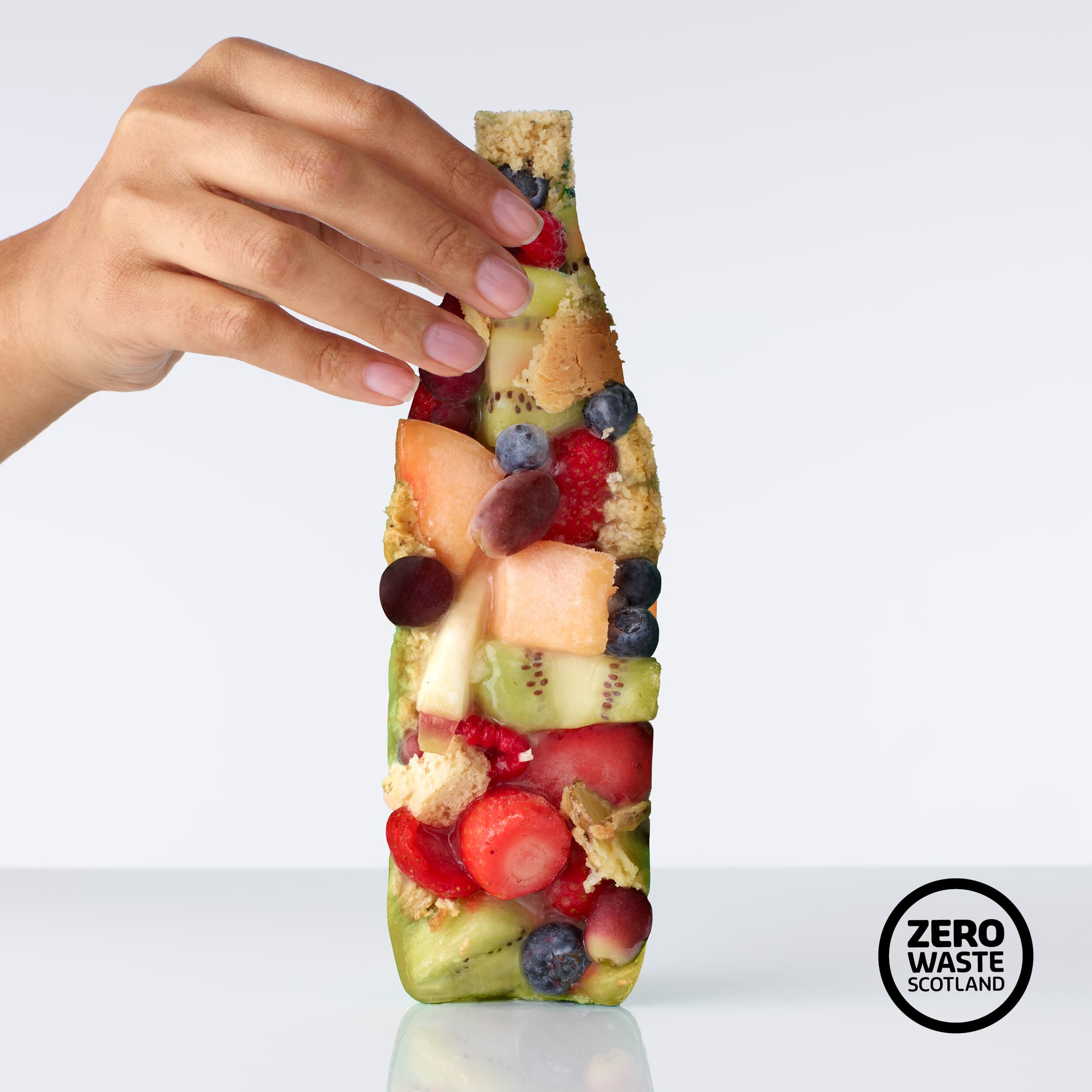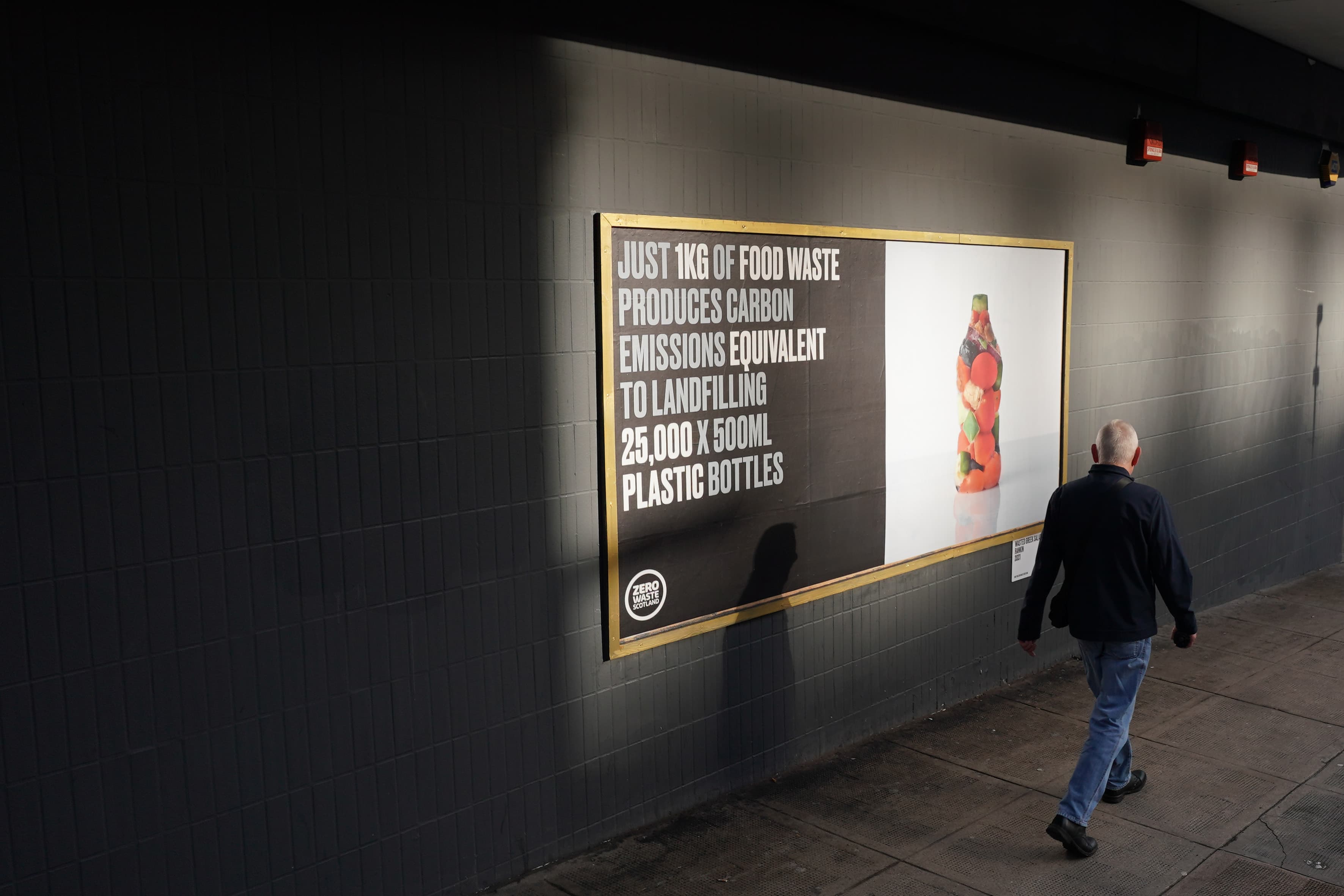It’s time to take food waste off the menu

It’s no secret that taking steps to reduce our carbon emissions is critical to protecting the future of our planet. We are all doing what we can to halt global warming, from turning down the thermostat, to switching to electric cars, to paying more heed to ‘reduce, reuse, recycle’ and minimising single-use plastic.
Interestingly, while world leaders congregated in Glasgow last year at COP26 to thrash out climate talks, it was a piece of art out with the SEC campus which held the most poignant message for me: food waste is a bigger contributor to climate change than plastic.
Just one kilogram of food waste produces the same amount of deadly carbon emissions as sending 25,000 500ml plastic bottles to landfill, according to Zero Waste Scotland.
To illustrate the problem, celebrity photographer, Rankin, created a stunning photography trail across Glasgow city centre, which was live throughout the COP26 conference and featured alluring but alarming, images created from everyday food destined for landfill.
The images and the statistics speak for themselves. While the environmental impact of food packaging has long been debated it seems obvious that the issue around food waste is now more pressing.
So how do we address it? How do we avoid unnecessary waste and reduce emissions?

Image credit: Zero Waste Scotland and Rankin
Perhaps part of the solution is food prices increases, for those who can afford to pay. A reset on food pricing and shopping, with meal planning consumer information to help us better prepare for weekly shops, reducing the chance of excess ingredients and or cooked food being thrown in the bin.
The modest carrot is a fine example of how food price and food waste are connected. A one kilogram (1Kg) bag of carrots in the supermarket costs around 40p. Many consumers regularly will only use just a few then leave the remainder to degrade in their fridge before they are eventually thrown away – contributing to the climate change crisis Rankin sought to demonstrate.
Would an increase in the price of the product encourage consumers to reconsider their choices in the supermarket, even opting for an individual item over buying a bulk bag that’s going to go to waste? Not only would the swap reduce food waste, it would also cut down the number of single use plastic bags used to contain multibuy items.
We’ve already seen consumer patterns change through COVID. Self-reported food waste levels in the UK fell by 34 percent during the first lockdown of 2020- the sharpest decline on record. The research carried out by Zero Waste Scotland, the Waste and Resources Action Programme (WRAP) and the University of Leeds suggested more considerate shopping and creative cooking contributed to the initial fall.
We’ve also seen local production and local shopping trends accelerating, with Scottish wholesale business and Spar Scotland operator CJ Lang citing the latter as a contributing factor to its 9.4 percent rise in annual sales. So, there is a willingness from consumers to be more responsible with their choices, but we need to ensure they are guided and supported to do so.
In terms of who’s responsible for taking these measures forward, it needs to be an industry wide approach. It certainly can’t all be down to the food producers, many of whom are already under crippling pressure to make ends meet. Famers in particular are finding it more difficult than ever at the moment following Brexit, in particular the changing landscape of subsidies, and the soaring costs of fertiliser.
Many food producers are already going to extraordinary lengths to ensure their practices are sustainable. Graham’s The Family Dairy has lodged plans for a low carbon heat project to generate and distribute bioenergy for onsite heat and power - a first for Scotland’s dairy industry.

Image credit: Zero Waste Scotland and Rankin
We’re also seeing huge advancements in agricultural technology with vertical farming enabling crops to be nurtured indoors in vertical irrigation systems, meaning farms can be built close to the consumers, helping to reduce food miles for consumers. Agricultural innovator and Johnston Carmichael client, Intelligent Growth Solutions, spent much of COP26 demonstrating this technology in its 5.4 metre vertical farm on the north bank of the River Clyde.
Food producers can’t be held wholly responsible: multiple retailers need to address the issue around cost and enable the changes required of consumer habits while the government helps implement these measures and ensure those who can’t afford food price increases are supported.
We can’t pretend it costs 40p for a farmer to get those carrots to the supermarket any longer. Agreeably it’s a sensitive issue and one which needs to be treated delicately to ensure we don’t raise levels of food poverty, but we need to seriously consider Rankin’s message and act now to ensure we protect our food industry, our supply chain, and ultimately our planet.
If you’d like to discuss this further, please don’t hesitate to get in touch with myself, a member of our Food & Drink team or your usual Johnston Carmichael adviser.
This article first appeared in The Herald on 14 December 2021.

